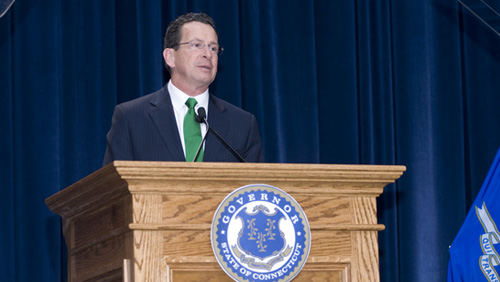The governor of Connecticut, Dannel Malloy, has given lawmakers until the end of the week to determine whether or not they are behind a push for sports betting this year. Malloy apparently wants to fast track any sports gambling legislation, even if a special session is needed, before he leaves office next January.
 In order to pass any laws on sports gambling, Malloy will first have to negotiate new agreements with the two tribal casino operators, the Mashantucket Pequots and the Mohegans, in the state. Coming as no surprise at all, the two tribes are interested in keeping the entire sports betting market to themselves. If he is successful in negotiating new agreements, they would still need to be approved by the federal Department of the Interior, which has ultimate jurisdiction over all tribal gaming in the country.
In order to pass any laws on sports gambling, Malloy will first have to negotiate new agreements with the two tribal casino operators, the Mashantucket Pequots and the Mohegans, in the state. Coming as no surprise at all, the two tribes are interested in keeping the entire sports betting market to themselves. If he is successful in negotiating new agreements, they would still need to be approved by the federal Department of the Interior, which has ultimate jurisdiction over all tribal gaming in the country.
In an interview with the local media outlet Connecticut Mirror, Malloy said, “The bottom line is in the last few weeks real action has taken place. People have started to move in a direction where I think an agreement could ultimately be reached with respect to who could operate within our state, how they would operate within their state, what could be bet on, and the like.”
The outlet talked to several lawmakers, who were hesitant about commenting on whether or not sports gambling could see the light of day this year. Senate President Martin Looney, a Democrat who represents New Haven, said, “That depends on the end result of the [negotiation] process.” Senate Republican leader Len Fasano was just as evasive, only stating, “[Governor Malloy] was just bringing us up to speed. We’re still talking.”
The tribes want sports gambling to be defined as a “casino game,” for which they hold exclusive rights in the state. However, lawmakers, including Attorney General George Jepsen, have rightfully challenged this definition. Needless to say, the tribes wouldn’t be excluded from any sports gambling endeavors, but they shouldn’t have exclusivity, according to Malloy.
There is concern that the tribes might attempt to withhold their revenue-sharing payments to the state—said to be worth around $204 million—if Connecticut tries to allow sports gambling to any entity other than the tribes. Lawmakers have felt the pressure and some indicate that the sports betting issue is much too complex to be pushed through the government this year (even though other states were able to enact legislation in as little as three months).





